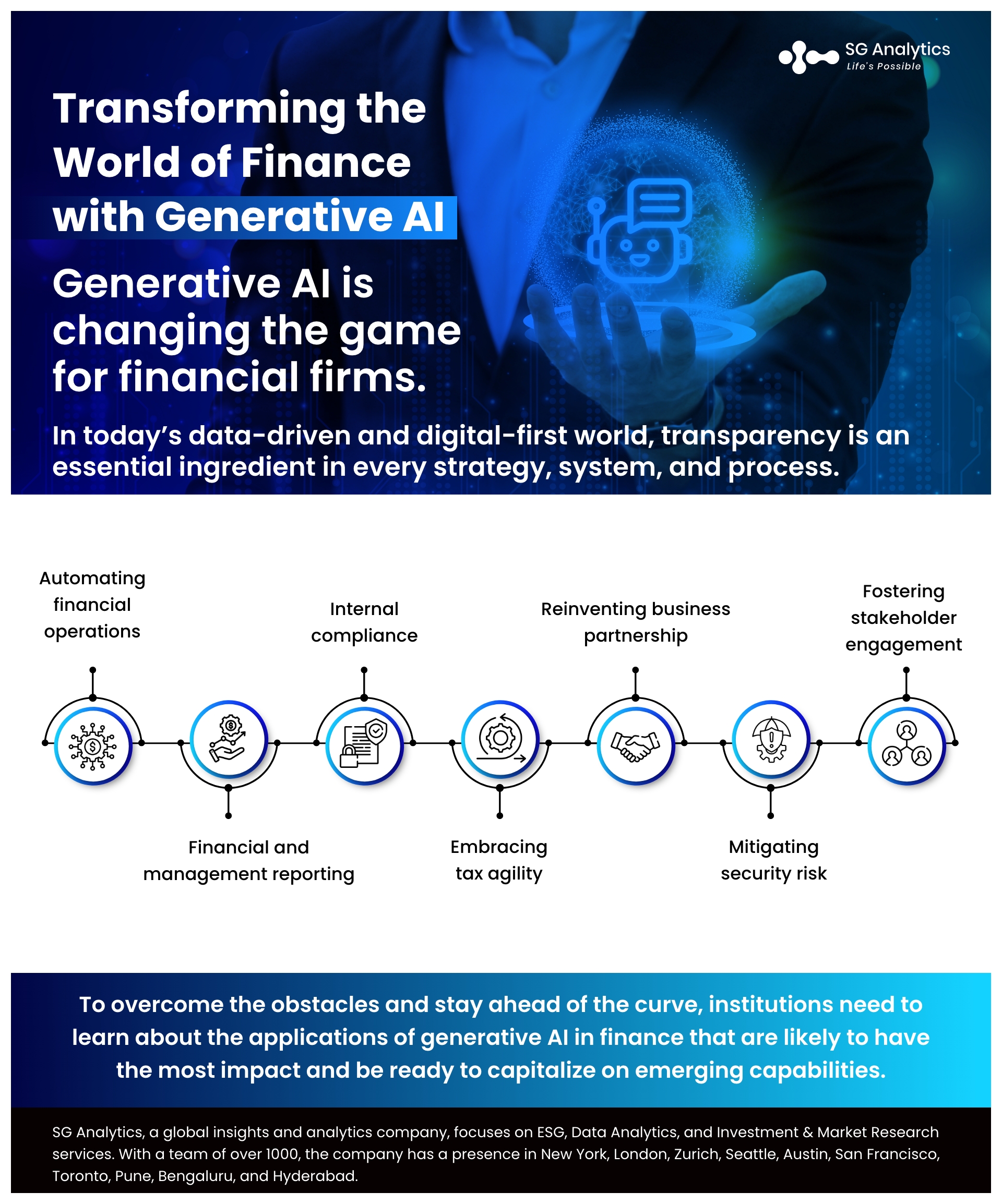Generative AI has unlocked exciting possibilities for industries. Unlike traditional AI/ML, generative AI enables businesses to analyze patterns in the existing data and design new content in a wide range of modalities.
In the world of finance, a new dawn is breaking called Generative AI. It is opening new horizons for the industry by igniting and transforming a revolution. Generative AI is emerging as a seismic shift in the way financial enterprises function. It is set to boost the world's economy by almost 7% and make people 1.5% more productive. It also holds the potential to enhance accuracy and efficiency, making Generative AI in the finance and banking industry an increasingly popular opportunity to cultivate growth.
The Rapid Adoption of Generative AI in Finance
Generative AI is revolutionizing every industry, such as retail, healthcare, education, and finance. The remarkable capabilities of Generative AI are enabling industry giants to reinvent their operations. The integration of generative AI into finance focuses on augmenting existing operations through narrative generation and analysis of small data sets. Current applications across the finance value chain include:
-
Finance Operations: Creating preliminary drafts for text-heavy tasks or requiring minimal analysis, like drafting contracts and supplementing credit reviews.
-
Accounting and Financial Reporting: Generating insights for successive iterations of financial statements or assisting with audit trials.
-
Finance Planning and Management: Performing ad-hoc analysis of structured or unstructured data sets, as well as creating reports for business partners.
-
Investor Relations: It assists in supporting critical aspects of the quarterly earnings calls.
Read more: How is Artificial Intelligence Shaping the Future of the BFSI Sector?

Strategic Planning and Management with Generative AI
Generative AI is changing the game for financial firms. Top enterprises are using AI to execute operations faster with unbiased decisions. It equips them to generate insights from vast data and analyze new directions. This technology further fosters a flexible and responsive financial environment, enabling leaders to break free from old operations.
-
Automating Financial Operations
With generative AI, the finance department is automating routine tasks and transforming their financial work. By placing innovation and flexibility at the core, it is further fostering companies to position finance with cutting-edge technology.
-
Financial And Management Reporting
Generative AI is assisting financial professionals to turn tedious financial reporting into a breeze. It further enables them to quickly create highly reliable drafts, automate complex tasks, and align with the fast-paced shifts. In the business landscape, it is making the lives of financial professionals easier and more efficient.
-
Internal Compliance
With generative AI, risk assessment is getting an upgrade. Companies are using technology to detect anomalies in real time while adding a new layer of protection to the financial landscape.
-
Embracing Tax Agility
Tax departments are adopting agility with generative AI. Financial institutions are leveraging this technology to change the way they operate and reshape the future of tax functions.

-
Reinventing Business Partnership
Generative AI is offering support to financial institutions and their business partners. This encompasses insights into financial forecasts and planning throughout the budget cycle and more comprehensive business intelligence. This is further enabling rapid and clear insight generation. By pairing generative AI with traditional AI, financial institutions can design use cases that will further help enhance their operational capabilities.
Read more: How To Improve Digital Sales in Fintech
-
Mitigating Security Risk
Finance teams were already integrating AI in audits in control environments to identify anomalies that could be indicators of fraud or noncompliance. However, the next wave of generative AI is set to take the industry a step further, enabling it to predict and explain anomalies. Timely identifying and communicating the associated risks could help prevent undesirable audit findings.
-
Fostering Stakeholder Engagement
Communication with stakeholders needs to be more effective and strategic. By crafting consistent and impactful messages, enterprises can reshape the future of stakeholder engagement across the services industry.
The Critical Challenges
Compared with other technologies, including ML, robotic process automation, and process mining, the barriers to experimenting with generative AI are moderately low. However, several critical challenges need to be addressed to unleash the technology’s potential in the future. These include:
-
Data Accuracy: Generative AI tools can often struggle to perform accurate calculations. It is vital to ensure highly accurate calculations with due diligence while designing generative AI tools. Alternatively, finance teams should also use workarounds to generate content based on calculations performed outside of the tools.
-
Security Breach of Proprietary Data: When training generative AI models, enterprises transmit proprietary data that can get leaked in a security breach.
-
Governance Model: Generative AI tools lack real-time information and contextual awareness. And there is no implicit or explicit governance model for validation.
Read more: From Awareness to Adoption: Marketers are Exploring New Ways for Technology Adoption

The Future of Finance
Generative AI promises progressive disruptions that financial institutions are yet to anticipate. With this promise comes responsibility and challenges that must be addressed to realize its true potential.
From personalized customer interactions to operations and security measures, Generative AI is emerging as a powerful catalyst for transformation. AI-driven investment strategies are set to initiate sudden shifts in market research trends and customer experience, thereby bridging the gap between technology and humanity. It is vital to note that generative AI is not just a technological advancement but a revolution that will completely transform the world of fintech. The future is filled with promise, innovation, and endless possibilities.
Looking ahead, the integration of generative AI will help in transforming core processes, reinventing business partnering, and mitigating underlying security risks. It will eventually collaborate with traditional AI forecasting tools to design reports, explain variances, and offer recommendations, thus elevating the finance function’s ability to generate forward-looking insights. These enhancements will empower finance professionals to make informed strategic decisions, leading to enhanced operational efficiency and effectiveness.
Key Takeaways
-
It is time for CFOs to identify and understand the applications of generative AI that are likely to have the most impact and equip themselves to capitalize on emerging capabilities.
-
Finance teams are integrating generative AI and other technologies to augment their existing processes by conducting research.
-
Moving forward, generative AI will work along with finance professionals to transform their core processes and mitigate risks.
-
The adoption of generative AI in finance, however, entails challenges such as accuracy, data security, and privacy.
Read more: Impact of Artificial Intelligence (AI) on Marketing for Retail Banking

Final Thoughts
Finance functions of global companies are hopping on the bandwagon of generative AI. The transformative potential of tools, including ChatGPT and Google Bard, is enabling them to understand and reshape work in the finance function.
With businesses and financial institutions integrating generative AI in their operations, they are moving towards reimagining the financial landscape with limitless possibilities. And the future is looking brighter than ever before. To harness the full potential of generative AI, financial institutions need to consider how technology can augment existing processes.
However, the adoption of generative AI in the finance landscape entails challenges, such as accuracy, data security, and privacy. To overcome the obstacles and stay ahead of the curve, institutions need to learn about the applications of generative AI in finance that are likely to have the most impact and be ready to capitalize on emerging capabilities.
SG Analytics, recognized by the Financial Times as one of APAC's fastest-growing firms, is a prominent insights and analytics company specializing in data-centric research and contextual analytics. Operating globally across the US, UK, Poland, Switzerland, and India, we expertly guide data from inception to transform it into invaluable insights using our knowledge-driven ecosystem, results-focused solutions, and advanced technology platform. Our distinguished clientele, including Fortune 500 giants, attests to our mastery of harnessing data with purpose, merging content and context to overcome business challenges. With our Brand Promise of "Life's Possible," we consistently deliver enduring value, ensuring the utmost client delight.
A leading enterprise in Data Analytics, SG Analytics focuses on leveraging data management, analytics, and data science to help businesses across industries discover new insights and craft tailored growth strategies. Contact us today to make critical data-driven decisions, prompting accelerated business expansion and breakthrough performance.









